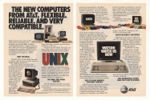Difference between revisions of "UNIX"
(Add links to FS articles, use proper names for early editions) |
(move CSRG list, add cat, etc) |
||
| Line 3: | Line 3: | ||
| creator = Ken Thompson, Dennis Ritchie and Douglas McIlroy at Bell Labs | | creator = Ken Thompson, Dennis Ritchie and Douglas McIlroy at Bell Labs | ||
| year introduced = 1969 | | year introduced = 1969 | ||
| − | | architecture = Originally [[PDP-7]], then [[PDP-11]] now cross-platform. | + | | architecture = Originally [[PDP-7]], then [[PDP-11]]; now cross-platform. |
| − | | type = Time-sharing | + | | type = [[Time-sharing]] |
| multitasking = Multitasking with paging/swap | | multitasking = Multitasking with paging/swap | ||
}} | }} | ||
| − | Unix (officially trademarked as | + | '''Unix''' (officially trademarked as '''UNIX'''® - the documentation switched from using 'UNIX' to 'Unix' as of V7) is a computer [[operating system]] originally developed in the 1960s and 1970s by a group of AT&T employees at Bell Labs including Ken Thompson, Dennis Ritchie and Douglas McIlroy. |
| − | Today's Unix systems are split into various branches, developed over time by AT&T as well as various commercial vendors and non-profit organizations. | + | Today's Unix systems are split into various branches, developed over time by AT&T as well as various commercial vendors and non-profit organizations. A number of clones of Unix, which share the interfaces, and 'look and feel', but no code, have also been produced. |
Versions of relevance for hobbyists include: | Versions of relevance for hobbyists include: | ||
| Line 28: | Line 28: | ||
== CSRG releases == | == CSRG releases == | ||
| − | Meanwhile the [[CSRG]] kept on releasing newer [[BSD]] UNIX's derived from 32v. | + | Meanwhile the [[CSRG]] kept on releasing newer [[BSD]] UNIX's derived from 32v. Descended from there are several popular versions: |
| − | |||
| − | |||
| − | |||
| − | |||
| − | |||
| − | |||
| − | |||
| − | |||
| − | |||
| − | |||
| − | [ | + | * [http://www.freebsd.org FreeBSD] focuses on providing a system geared towards a single user. |
| − | [http://www. | + | * [http://www.netbsd.org NetBSD] will run on a variety of 32-bit older systems from the [[VAX]] to the [[Amiga]]. |
| − | + | * [http://www.openbsd.org OpenBSD] derived from the NetBSD project will run on all kinds of systems. | |
| − | |||
| − | [http://www.openbsd.org OpenBSD] derived from the NetBSD project will run on all kinds of systems. | ||
==See also== | ==See also== | ||
| + | * [[:Category: Unix OS's]] | ||
| + | * [[:Category: Unix-based OS's]] | ||
* [[UNIX file system]] | * [[UNIX file system]] | ||
* [[BSD Fast File System]] | * [[BSD Fast File System]] | ||
| − | |||
| − | |||
{{Nav Unix}} | {{Nav Unix}} | ||
| + | |||
| + | [[Category: Operating Systems]] | ||
Revision as of 17:12, 17 June 2018
| Unix | |
| Type: | Time-sharing |
|---|---|
| Creator: | Ken Thompson, Dennis Ritchie and Douglas McIlroy at Bell Labs |
| Multitasking: | Multitasking with paging/swap |
| Architecture: | Originally PDP-7, then PDP-11; now cross-platform. |
| Date Released: | 1969 |
Unix (officially trademarked as UNIX® - the documentation switched from using 'UNIX' to 'Unix' as of V7) is a computer operating system originally developed in the 1960s and 1970s by a group of AT&T employees at Bell Labs including Ken Thompson, Dennis Ritchie and Douglas McIlroy.
Today's Unix systems are split into various branches, developed over time by AT&T as well as various commercial vendors and non-profit organizations. A number of clones of Unix, which share the interfaces, and 'look and feel', but no code, have also been produced.
Versions of relevance for hobbyists include:
- Unix System 1 - The first version of UNIX that has been recently made to run on the PDP-11
- UNIX V5 - One of first version with known source and binaries available.
- UNIX V6 - The last version before branches started to appear
- Unix V7 - One of the most complete and the last generally available and PDP-11 version of Research UNIX
- Unix/32V - A 32bit port of System 7 to the VAX 11/780.
Unix then went commercial and was sold. Below is an early ad for AT&T UNIX.
CSRG releases
Meanwhile the CSRG kept on releasing newer BSD UNIX's derived from 32v. Descended from there are several popular versions:
- FreeBSD focuses on providing a system geared towards a single user.
- OpenBSD derived from the NetBSD project will run on all kinds of systems.
See also
| v • d • e UNIX Versions, Vendors and Related |
|---|
| Research Unix PDP-7 UNIX • V1 • V2 • V3 • V4 • V5 • V6 • V7 • V8 • V9 • V10 • LSX • MINI-UNIX • Unix/32V
AT&T - CB-UNIX • PWB/UNIX • USG UNIX • System III • System IV • System V BSD - 2.9 BSD • 2.10 BSD • 2.11 BSD • 3BSD • 4BSD • 4.1 BSD • 4.2 BSD • 4.3 BSD • 4.4 BSD BSD Descendants 386BSD • NetBSD • FreeBSD • OpenBSD • NeXTSTEP • Darwin |
| Other - xv6 • AMIX • SunOS • Solaris • ULTRIX • A/UX • XENIX • AIX • Dell UNIX |
